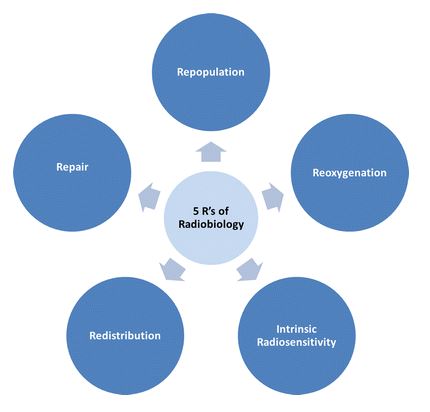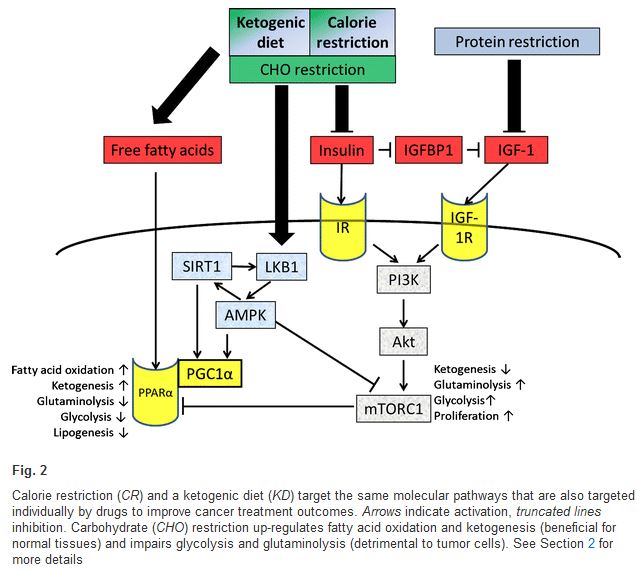Calories, carbohydrates and cancer, Oh MY! Does your oncologist still think nutrition plays no part in cancer treatment? Join Susie T. Gibbs of Fast Days Healing Days as she introduces a review by Rainer Klement, PhD, and Colin Champ, MD, entitled Calories, Carbohydrates and Cancer Therapy With Radiation: Exploiting the Five R’s Through Dietary Manipulation. The review was published recently in Cancer and Metastasis Reviews, a top ISI journal dedicated to new developments in the treatment and biology of malignant disease. What does this mean to alternate day intermittent fasting? Join us to find out!
Abstract – The review, by Klement and Champ, evaluates animal and human frameworks to determine the potential roles for calorie restriction (CR) and very low carbohydrate ketogenic diets (KD) in moderating the “five R’s of radiation therapy” with the intention of improving radiation outcomes from the perspective of controlling tumor growth and from the probability of normal tissue complication. It takes into account the commonalities and differences between CR and KD diets and folks, the results are encouraging—but I could have told them that firsthand!
After evaluating 5 major facets of radiotherapy, namely:

The 5 R’s of Radiotherapy
1. Improved DNA repair in normal, non-tumor cells.
2. Inhibition of tumor regrowth via the mTOR pathway (downstream from IGF1 and insulin).
3. DNA changes of non-tumor cells into more radio-resistant phases of the cell cycle.
4. Normalization of tumor vascularization (blood vessels) by targeting tumor necrosis factor (downstream of mTOR).
5. Increasing intrinsic radioresistance of normal cells while decreasing radioresistance in tumor cells via ketone bodies and the glycolytic pathway.
The review concludes that CR and KDs may have a synergistic effect on radiation therapy for the treatment of cancer and might be able to provide some guidelines for implementing dietary interventions into “standard of care” and cancer intervention.

Please see the full review at Springer.
Notes: This is excellent news for those presently undergoing radiation for malignant tumors. As an anecdotal, n=1, note: I went through cancer therapy that included neo-adjuvant chemotherapy and post double mastectomy radiation with booster treatments for the treatment of a high grade, poorly differentiated, Stage IIIC, hormone positive, invasive ductile breast cancer with 14 of 36 regional node metastes in 2012. Although aggressive, the oncologist referred to my tumor as a “lazy eater” of chemo and that it would probably have had a better response to anti-hormone drugs (such as Femara, an aromatase inhibitor).
When I first learned of my diagnosis, I went into overdrive during the following weeks, reading as many studies as possible in order to familiarize myself with the enemy and to learn what steps I could take to help affect outcome. Namely, I knew I was on the doorstep of having “chronic disease” as in a Stage IV cancer and knew we had to hit treatment in a highly aggressive manner.
I read about preliminary studies showing an affinity for fasting and chemo and radiation. The studies showed the possibility of intermittent fasting as a means of magnifying chemo and radiation treatment effects, while simultaneously protecting healthy cells. I had been low carbing for most of 14 years (90/10—about 90% of the time as a low carber with 10% of the time eating higher carb). The studies also discussed the potential of making the tumor more aggressive through KDs. And it was unknown if the effects would persist with a keto adapted subject (which I had been).
When I found out I had cancer, I went off the rails and onto what I now call my “make-a-wish-diet.” It was a magic diet where I could eat anything that tasted great (and was horrible for me) without consequences of ill-health, weight gain, etc. So I was directly feeding the tumor with sugar (broken down by carbohydrate metabolism or glycolysis). Bad Bad Bad.
So I decided to take the leap of faith and go back on a very strict low carb diet with my alternate day intermittent fasting diet thrown in for double-measure. I decided I would go into each chemo therapy fasted a minimum of 16-20 hours and would eat sparingly the evening of treatment, then resume the alternate day rotation. (You see, I didn’t realize that 1 day of fasting in mice, was equal to a week of fasting in humans. So I did every other day, aka alternate day, ketogenic fasting.) I had 8 rounds of treatment 2-3 weeks apart. I had a greater than 60% reduction in primary tumor size. My oncologist was shocked at the response to chemo and was encouraged at my chances of recurrence-free remission as a result of the chemo response. All of the positive nodes showed that the chemo had effected changes to the cancer cells, and even though I had one of the nodes with a rupture and tumor growth outside the node, the doctors were very encouraged at the neo-adjuvant (before surgery) chemo results.
I’d weathered chemo fairly well, with only 3 really major health issues, doing better than many. I found out later, that my chemo dose was very high. And yet, my white blood cells and platelets remained out of the critical danger zone. They were bad. But not bad enough to warrant hospitalization or intervention beyond a bone marrow stimulating shot called Neulasta (which I took the day following each chemo treatment).
After surgery, I went into radiation with the same ADF IF routine. The biggest problem though, was losing too much weight. You aren’t supposed to lose weight during radiation because the dose is determined, in part, based on weight. I had a 10% cushion in either direction. I had 33 daily doses of radiation that included 5 boosters (super power) in the supra clavicular region (above the collar bone lymph nodes). I still went in with a 14-16 hour daily fast and did as much alternate day action as possible, while trying to maintain my weight and not lose. I continued eating low carb, ketogenic (between 20-40g of net carbs daily).
I did have radiation burns under my arm and chest, along with difficulty swallowing and bad mucus proliferation in my throat, but the radiation oncologist told me that I’d had a much better response than many in my situation with fewer complications and was able to do all 33 sessions without a lapse. Which should improve my 5 year outcome.
With 14 out of 36 nodes positive, my chance of recurrence is pretty high, but chemo and radiation, in addition to the radical mastectomy and lymph node dissection improve my odds. There is no doubt in my mind that my n=1 nutritional intervention contributed to the success of treatments. Today, I continue eating low carb and continue to intermittent alternate day fast with a 14-18 hour daily fast. I will take Femara (aromatase inhibitor aka anti-hormone, anti-cancer drug) for the next 10 years. I am still undergoing reconstruction with the 4th surgery due sometime this year and struggle with ongoing fatigue, throat mucus, cellulitis infections in the irradiated arm, and systemic fungal infections, in addition to Stage II lymphedema in my irradiated arm.
In some ways, the aftermath is harder to bear than the original cancer treatment. But I’m happy and grateful to God, my healers, and to my intermittent alternate day, ketogenic diet, to be alive. And I’m convinced that ADF and KDs work to improve health and fight deadly diseases of metabolism such as cancer!



Recent Comments